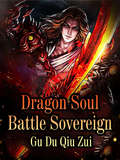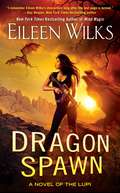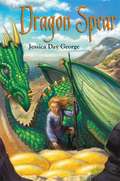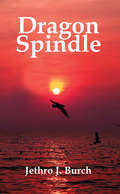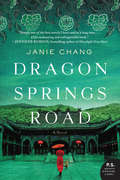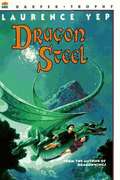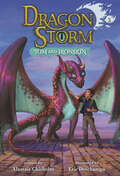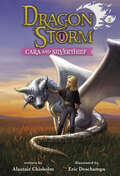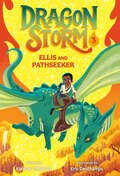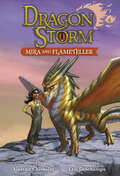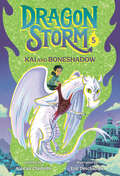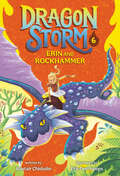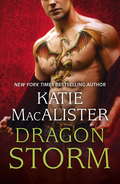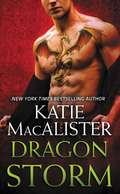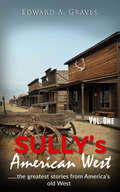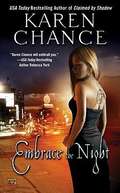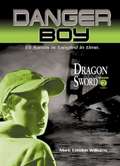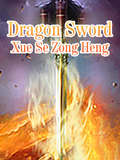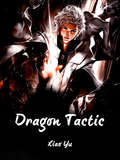- Table View
- List View
Dragon Soul Battle Sovereign: Volume 4 (Volume 4 #4)
by Du GuQiuZuiThe young man Long Yan has lacked the martial arts soul since he was a child. In the world respected by martial arts, he is undoubtedly a waste body. Unexpectedly, he accidentally got the remnant soul of the dragon, and began the martial arts inheritance. In order to chase love and understand the mystery of Dragon Spirit's life experience, he finally set foot on the road to hegemony in the world.☆About the Author☆Dugu Qiuzui, a new online novelist, his has accumulated a lot of popularity for him. The teenager portrayed in this novel has a strong and unyielding character, a quality of true to good, and is loved by everyone.
Dragon Soul Battle Sovereign: Volume 5 (Volume 5 #5)
by Du GuQiuZuiThe young man Long Yan has lacked the martial arts soul since he was a child. In the world respected by martial arts, he is undoubtedly a waste body. Unexpectedly, he accidentally got the remnant soul of the dragon, and began the martial arts inheritance. In order to chase love and understand the mystery of Dragon Spirit's life experience, he finally set foot on the road to hegemony in the world.☆About the Author☆Dugu Qiuzui, a new online novelist, his has accumulated a lot of popularity for him. The teenager portrayed in this novel has a strong and unyielding character, a quality of true to good, and is loved by everyone.
Dragon Soul Battle Sovereign: Volume 6 (Volume 6 #6)
by Du GuQiuZuiThe young man Long Yan has lacked the martial arts soul since he was a child. In the world respected by martial arts, he is undoubtedly a waste body. Unexpectedly, he accidentally got the remnant soul of the dragon, and began the martial arts inheritance. In order to chase love and understand the mystery of Dragon Spirit's life experience, he finally set foot on the road to hegemony in the world.☆About the Author☆Dugu Qiuzui, a new online novelist, his has accumulated a lot of popularity for him. The teenager portrayed in this novel has a strong and unyielding character, a quality of true to good, and is loved by everyone.
Dragon Soul Battle Sovereign: Volume 7 (Volume 7 #7)
by Du GuQiuZuiThe young man Long Yan has lacked the martial arts soul since he was a child. In the world respected by martial arts, he is undoubtedly a waste body. Unexpectedly, he accidentally got the remnant soul of the dragon, and began the martial arts inheritance. In order to chase love and understand the mystery of Dragon Spirit's life experience, he finally set foot on the road to hegemony in the world.☆About the Author☆Dugu Qiuzui, a new online novelist, his has accumulated a lot of popularity for him. The teenager portrayed in this novel has a strong and unyielding character, a quality of true to good, and is loved by everyone.
Dragon Soul Battle Sovereign: Volume 8 (Volume 8 #8)
by Du GuQiuZuiThe young man Long Yan has lacked the martial arts soul since he was a child. In the world respected by martial arts, he is undoubtedly a waste body. Unexpectedly, he accidentally got the remnant soul of the dragon, and began the martial arts inheritance. In order to chase love and understand the mystery of Dragon Spirit's life experience, he finally set foot on the road to hegemony in the world.☆About the Author☆Dugu Qiuzui, a new online novelist, his has accumulated a lot of popularity for him. The teenager portrayed in this novel has a strong and unyielding character, a quality of true to good, and is loved by everyone.
Dragon Soul Battle Sovereign: Volume 9 (Volume 9 #9)
by Du GuQiuZuiThe young man Long Yan has lacked the martial arts soul since he was a child. In the world respected by martial arts, he is undoubtedly a waste body. Unexpectedly, he accidentally got the remnant soul of the dragon, and began the martial arts inheritance. In order to chase love and understand the mystery of Dragon Spirit's life experience, he finally set foot on the road to hegemony in the world.☆About the Author☆Dugu Qiuzui, a new online novelist, his has accumulated a lot of popularity for him. The teenager portrayed in this novel has a strong and unyielding character, a quality of true to good, and is loved by everyone.
Dragon Spawn
by Eileen WilksThe New York Times bestselling author of Mind Magic returns as FBI agent Lily Yu gets some very bad news... Lily learns she was right. Tom Weng--a powerful sorcerer allied with the Old One who keeps trying to take over the world--is still alive. But that's not the worst. Weng is a dragon spawn, the product of a botched hatching given a human form in an attempt to keep him from going mad. A failed attempt. Meanwhile, Lily's husband Rule is facing a Challenge to the death. Then there's the possible reappearance of another sorcerer. But none of that matters when their enemy strikes out of nowhere in the worst way possible. Lily must face a nightmare and return to a place she never wanted to see again. The place where she died...
Dragon Spear (Dragon Slippers #3)
by Jessica Day GeorgeCreel's adventures continue when she, her brother, and her betrothed travel across the seas to visit their dragon friends and become involved in a battle against an alien group of dragons that has kidnapped Queen Velika, endangering her and her expected litter of hatchlings. Sequel to Dragon Flight.
Dragon Spindle
by Jethro J. BurchBalance of life is key to the realm of Ningazia and the struggle between the forces of good and evil have always been in check. But due to an ancient evil that now plagues the realm, a path is set to restore balance and bring the realm back from the brink of destruction. This is the battle of ancient races that starts with the destruction of the dragon race by an evil creature hell bent on total dominion over all. After the once-beloved race of dragons is destroyed, a path is set in motion to restore that was once lost and bring the ancient evil into accord, bringing back balance to the realm and beyond into the multiverse. Varian, a boy with unknowing power, will struggle with the magic he has been granted and choose his journey with the help of his trusted friends and allies he meets along the way, he will try and set the balance and restore what was once lost!
Dragon Springs Road: A Novel
by Janie ChangFrom the author of Three Souls comes a vividly imagined and haunting new novel set in early 20th century Shanghai—a story of friendship, heartbreak, and history that follows a young Eurasian orphan’s search for her long-lost mother.That night I dreamed that I had wandered out to Dragon Springs Road all on my own, when a dreadful knowledge seized me that my mother had gone away never to return . . . In 1908, Jialing is only seven years old when she is abandoned in the courtyard of a once-lavish estate near Shanghai. Jialing is zazhong—Eurasian—and faces a lifetime of contempt from both Chinese and Europeans. Without her mother’s protection, she can survive only if the estate’s new owners, the Yang family, agree to take her in.Jialing finds allies in Anjuin, the eldest Yang daughter, and Fox, an animal spirit who has lived in the haunted courtyard for centuries. But Jialing’s life as the Yangs’ bondservant changes unexpectedly when she befriends a young English girl who then mysteriously vanishes.Always hopeful of finding her long-lost mother, Jialing grows into womanhood during the tumultuous early years of the Chinese republic, guided by Fox and by her own strength of spirit, away from the shadows of her past. But she finds herself drawn into a murder at the periphery of political intrigue, a relationship that jeopardizes her friendship with Anjuin and a forbidden affair that brings danger to the man she loves.
Dragon Steel (Dragon #2)
by Laurence YepReturning to her underwater dragon kingdom expecting to be rewarded for capturing an enchantress, Shimmer and young Thorn instead must continue their quest to restore the dragon princess's clan to its ancestral home. A tale of dungeons, sea monsters, and magicians, this sequel to Dragon of the Lost Sea "will lure even more readers to [Yep's] legion of followers." -V.
Dragon Storm #1: Tom and Ironskin (Dragon Storm #1)
by Alastair ChisholmSummon the power of a dragon with a young boy who discovers that dragons are real --in this new action-packed chapter book fantasy series, perfect for readers of Dragon Masters and Unicorn Academy!Tom never knew dragons were real. Then he was taken to the Guild—a training ground for young dragonseers. Now he and his dragon, Ironskin, must bond, discover Ironskin&’s power, and train to be heroes. When Iron-skin disappears, Tom worries that he isn&’t a dragonseer after all. Can Tom bring Ironskin back? And can he do it in time to help his kingdom? Soar into more Dragon Storm adventures! • #1 Tom and Ironskin • #2 Cara and Silverthief
Dragon Storm #2: Cara and Silverthief (Dragon Storm #2)
by Alastair ChisholmSummon the power of a dragon with a young thief who discovers that her best friend is actually a dragon -- in this new action-packed chapter book fantasy series, perfect for readers of Dragon Masters and Unicorn Academy!Cara has always had a little voice inside her head that's helped her out of danger. When that voice turns out to be a dragon, Cara's world is turned upside-down! Suddenly, she and Silverthief are part of a secret guild of Dragonseers -- a select few who can see dragons and together protect their kingdom from enemies. But Silverthief is suspicious. Is the Guild really that perfect? Or are some things just too good to be true? Soar into more Dragon Storm adventures! • #1 Tom and Ironskin • #2 Cara and Silverthief
Dragon Storm #3: Ellis and Pathseeker (Dragon Storm #3)
by Alastair ChisholmSummon the power of a dragon as a young mapmaker finds his way through a maze -- and into danger -- in this action-packed chapter book fantasy series! Perfect for readers of Dragon Masters and Unicorn Academy!In the kingdom of Rivven, dragons are forbidden. But young Ellis and his dragon Pathseeker are part of a secret league of dragonseers known as the Guild -- and they love mazes! Ellis is eager to win Rivven's tournament of mazes, so he enters the race. But there's something wrong with the maze and it's connected to a mysterious girl using dangerous dragon magic! Now, Ellis and Pathseeker face a far greater challenge. Can they stop the mysterious girl from destroying the maze? And can they do it without revealing the secrets of the Guild? Soar into more Dragon Storm adventures!#1 Tom and Ironskin#2 Cara and Silverthief#3 Ellis and Pathseeker#4 Mira and Flameteller
Dragon Storm #4: Mira and Flameteller (Dragon Storm #4)
by Alastair ChisholmSummon the power of a dragon! A girl and her dragon have a knack for mechanics in this action-packed chapter-book fantasy series, perfect for readers of Dragon Masters and Unicorn Academy!Mira and Flameteller are handy when it comes to machines. Their skill is needed now more than ever when the machine that powers the Dragonseer Guild Hall breaks. The Guild Hall protects young dragonseers and their dragons, like Mira and Flameteller. And if the machine isn&’t fixed, anyone will be able to break in! An angry mob of people who dislike dragons is hunting for the secret location, so the pressure is on to get the machine fixed quickly. It&’s up to Mira and Flameteller to save their friends... before it&’s too late!Soar into more Dragon Storm adventures!#1 Tom and Ironskin#2 Cara and Silverthief#3 Ellis and Pathseeker
Dragon Storm #5: Kai and Boneshadow (Dragon Storm #5)
by Alastair ChisholmEnter a world of secret dragons! Young Kai and his fellow dragonseers must use their powers to protect their kingdom from dark forces in this action-packed chapter-book fantasy series, perfect for readers of Dragon Masters!Kai and his fellow dragonseers practice their powers in a hidden cavern known as Guild Hall. But when the royal prince invites them to the palace, the dragonseers must leave the safety of their hideout. There they encounter a fearsome dragon and a mystical potion in a secret lair! The others sense danger, but Kai feels strangely drawn to a mysterious dark force, one with the power to destroy. Will he ignore the warnings of his own loyal dragon, Boneshadow, and risk losing everything to explore the dangerous unknown?Soar into more Dragon Storm adventures!#1 Tom and Ironskin#2 Cara and Silverthief#3 Ellis and Pathseeker#4 Mira and Flameteller#5 Kai and Boneshadow
Dragon Storm #6: Erin and Rockhammer (Dragon Storm #6)
by Alastair ChisholmGet ready to enter a magical world filled with secret dragons and their summoners--the dragonseers! Meet, Erin, a young dragonseer, as she hones her fight-or-flight instincts in this thrilling fantasy series that's perfect for readers ages 7-10!To all the other dragonseers, Erin and her dragon, Rockhammer, seem indestructible. They are well-respected by the others in the Dragonseer Guild. But under Erin's tough exterior, she is hiding a secret about who she is—and why she has trouble summoning her dragon. She is scared of losing control...After a fight breaks out with another dragonseer, Erin is sent away to a place called Stillness, home to a magical stone with calming powers. But danger lurks as mysterious soldiers arrive to snatch the stone, forcing Erin to confront her greatest fear, or risk losing everything she holds dear. Soar into more Dragon Storm adventures!#1 Tom and Ironskin#2 Cara and Silverthief#3 Ellis and Pathseeker#4 Mira and Flameteller#5 Kai and Boneshadow#6 Erin and Rockhammer
Dragon Storm (Dragon Fall #2)
by Katie MacAlisterTURN ON THE CHARMAccording to some (including himself), Constantine is one of the greatest heroes of dragonkin who ever lived. Too bad he's now lonelier than ever and his biggest adventure involves a blow-up sheep-until he has an opportunity to save his kind once again. All Constantine has to do is break into a demon's dungeon, steal an ancient artifact, and reverse a deadly curse. The plan certainly does not involve rescuing a woman...TURN UP THE HEATBee isn't sure whether to be infuriated or relieved when Constantine pops up in her prison. The broody, brawny shifter lights her fire in a way no one ever has before, yet how far can she really trust him? Their chemistry may be off the charts, but when push comes to shove, Constantine will have to make a crucial choice: to save the dragons or the woman he's grown to love with fierce intensity.
Dragon Storm (Dragon Fall #2)
by Katie MacAlisterTURN ON THE CHARMAccording to some (including himself), Constantine is one of the greatest heroes of dragonkin who ever lived. Too bad he's now lonelier than ever and his biggest adventure involves a blow-up sheep-until he has an opportunity to save his kind once again. All Constantine has to do is break into a demon's dungeon, steal an ancient artifact, and reverse a deadly curse. The plan certainly does not involve rescuing a woman . . . TURN UP THE HEATBee isn't sure whether to be infuriated or relieved when Constantine pops up in her prison. The broody, brawny shifter lights her fire in a way no one ever has before, yet how far can she really trust him? Their chemistry may be off the charts, but when push comes to shove, Constantine will have to make a crucial choice: to save the dragons or the woman he's grown to love with fierce intensity.
Dragon Strike (Sully's American West #1)
by Edward A. GravesWilliam Garvey Sullivan, a sixteen year old boy in Ireland with a passion for adventure, unexpectedly finds passage to America. He is liked by most everyone he meets, has an exceptional gift for gab, can outwork most anyone, plays a good fiddle, and loves to cook for himself and others. These are the attributes that will eventually carry him across America’s West. He arrives in New York on the eve of the infamous New York Draft Riots After the dust settles, he is befriended by famous pub owner John McSorley. Together they invent the portable kitchen, later called the “chuck wagon. McSorley finances Sully to travel West with the “moving restaurant” to cater to soldiers out west who are being fleeced by Sutlers.. In the process he meets the famous and sees history at places like the OK Corral and in towns like Dodge City and Tombstone Arizona. The story is a big one, as big as the West itself. It cannot be told in one book, Volume One ends as Sully leaves New Mexico and Big Jim Chisum’s ranch and goes on the road to Tombstone, Arizona at the invitation of Wyatt Earp.
Dragon Strike (The Age of Fire #4)
by E. E. KnightA dark and riveting fantasy of three dragon siblings, from the author of The Vampire Earth novels The fourth in the Age of Fire series following Dragon Champion, Dragon Avenger, and Dragon Outcast... Scattered across a continent and scarred by their harsh experiences on the path to adulthood, the three dragon siblings are among the last of a dying breed, the final hope for their species' survival. After being separated by dwarf slave traders who found their nest, the three--AuRon, the rare scaleless gray; Wistala, the green female; and Copper, the embittered cripple--are reunited. But their reunion is not a happy one, since the three find themselves at odds over the coming human war. AuRon thinks dragons should have no part in the affairs of humans. Wistala believes dragons and man can peacefully co-exist. And Copper has designs of his own on the world. And the civilized humans who have turned to Copper for assistance against their savage enemies have just given him the perfect opportunity to fulfill his plans...
Dragon Sword (Danger Boy #2)
by Mark London WilliamsHitch a ride through time on the Danger Boy adventures! These rich, action-filled fantasies about a reluctant time-traveler and his unusual sidekicks will keep readers on the edge of their seats. In DANGER BOY: DRAGON SWORD, Eli's time-traveling talent leads him to his missing mother's location: San Francisco at the start of World War II. Unfortunately, Margarite Sands is deeply involved in efforts to keep time-sphere technology away from the enemy, and once again Eli is thrown into the thick of things. He and his fellow time-adventurers, Clyne and Thea, are hurled far into the past, where they find new allies in the legendary King Arthur and his wizard, Merlin. Together, they must do whatever it takes to keep the powerful sword Excalibur from falling into Nazi hands.
Dragon Sword: Volume 1 (Volume 1 #1)
by Xue SeZongHeng"Infinite Horror" November 11, 2020 11: 11: 11, this is a special day..."Do you understand the meaning of life? He wanted to truly … Alive? "This sentence was like a heron to countless people, as did Xiao Sheng. For the sake of life, for the sake of passion, he chose to step into this world full of terror. Here, this was a game, but …
Dragon Sword: Volume 2 (Volume 2 #2)
by Xue SeZongHeng"Infinite Horror" November 11, 2020 11: 11: 11, this is a special day..."Do you understand the meaning of life? He wanted to truly … Alive? "This sentence was like a heron to countless people, as did Xiao Sheng. For the sake of life, for the sake of passion, he chose to step into this world full of terror. Here, this was a game, but …
Dragon Tactic: Volume 1 (Volume 1 #1)
by Xiao YuAn accident through to another world proud of him to stand here nature to be strong but one after another plot to make him deeply tired but he wants to become strong because he has friends to protect there are like people to love bully them die this is the motivation and courage of longyuan to live when longyuan was also betrayed by his girlfriend when he will not be despair of the world only blame their love when in another world the person who really loves appears he wants to guard him every minute and every second
